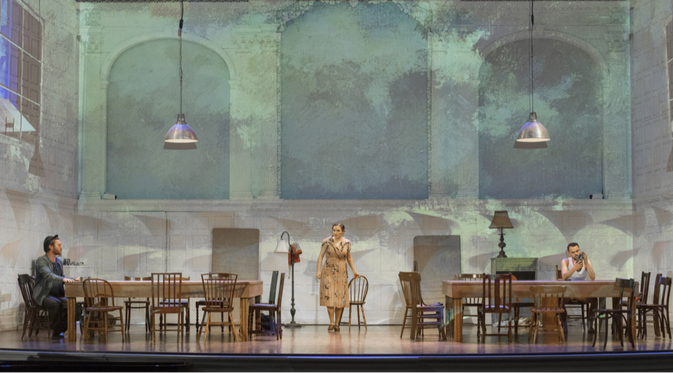|
Le Pauvre Matelot
composed by Darius Milhaud libretto by Jean Cocteau produced by Yale Opera directed by Dustin Wills scenic design by Dustin Wills costume design by Rebecca Welles lighting design by Doug Harry projections design by Johnny Moreno properties by Cailey Harwood-Smith stage management by Julie Hurley Featuring performances by Natalia Rubis, soprano Stephen Clark, bass Dean Murphy, baritone Lucas Van Lierop, tenor Synopsis |
In a small seaside town, a woman waits in her struggling bar for the return of her sailor husband who has been gone for fifteen years. She hasn’t heard any word of his whereabouts and imagines him dead, or maybe he’ll return rich, or maybe he’s lost at sea, or, or, or... she lives in an unhappy dream. The woman finds companionship with a friend who keeps a shop across the street, and who has proposed marriage to her – but she refuses to marry him because the specter of her husband looms over her. Her pitiful father also resides with her and begs her to move on and marry the young man from across the street. This is the stasis where the aimless trio has lived for years and years.
ACT I
On this evening, the woman and her father are drowning their sorrows, the friend skulks, and the bar has been empty (it usually is). Before the friend retires to his shop that night, he borrows a hammer from the woman then heads home. Late in the night the sailor finally returns, and before returning home to his wife, he first visits the friend to inquire about his wife’s fidelity. The sailor has changed so much that the friend mistakes him for a drunkard and tries to attack him – but soon he recognizes his long lost friend. The sailor reveals that he returns with riches in tow, and concocts a plan to trick his wife.
ACT II
The next morning, He returns home and - taking advantage of his changed appearance – introduces himself to his wife as an “acquaintance” of her husband. He informs her and that her husband is alive but he owes many debts and is currently in hiding, but will return in a week’s time. He then spins a tale of how an exotic Queen romantically tempted both himself and her husband; how her husband refused her advances and was turned away penniless but he acquiesced and was rewarded with an expensive string of pearls, which he shows to her. The woman is overcome with emotion and admits she has no money to cover her husband’s debts. Her husband (still playing the trick) asks to stay the night in the bar and hide his treasure there, which she accepts… The friend, distraught and desiring to see the woman to find out what’s happening, returns the hammer to the woman late in the evening. They exchange some brief words at the door and she takes the hammer.
ACT III
Hours pass deep into night and further into the earliest morning. And in those rare hours, the nightmares that have been lurking beneath the surface erupt…
ACT I
On this evening, the woman and her father are drowning their sorrows, the friend skulks, and the bar has been empty (it usually is). Before the friend retires to his shop that night, he borrows a hammer from the woman then heads home. Late in the night the sailor finally returns, and before returning home to his wife, he first visits the friend to inquire about his wife’s fidelity. The sailor has changed so much that the friend mistakes him for a drunkard and tries to attack him – but soon he recognizes his long lost friend. The sailor reveals that he returns with riches in tow, and concocts a plan to trick his wife.
ACT II
The next morning, He returns home and - taking advantage of his changed appearance – introduces himself to his wife as an “acquaintance” of her husband. He informs her and that her husband is alive but he owes many debts and is currently in hiding, but will return in a week’s time. He then spins a tale of how an exotic Queen romantically tempted both himself and her husband; how her husband refused her advances and was turned away penniless but he acquiesced and was rewarded with an expensive string of pearls, which he shows to her. The woman is overcome with emotion and admits she has no money to cover her husband’s debts. Her husband (still playing the trick) asks to stay the night in the bar and hide his treasure there, which she accepts… The friend, distraught and desiring to see the woman to find out what’s happening, returns the hammer to the woman late in the evening. They exchange some brief words at the door and she takes the hammer.
ACT III
Hours pass deep into night and further into the earliest morning. And in those rare hours, the nightmares that have been lurking beneath the surface erupt…
